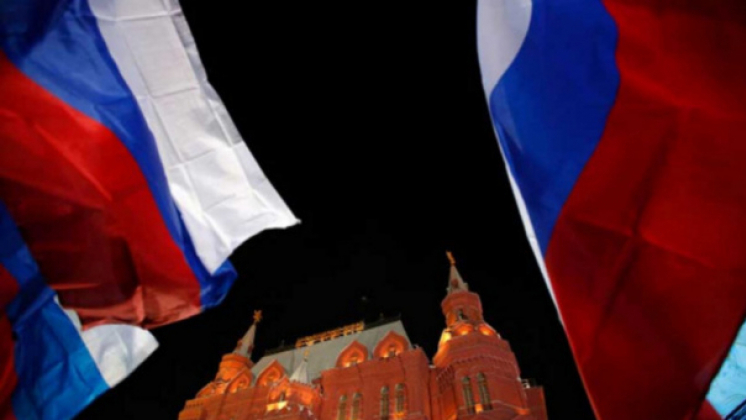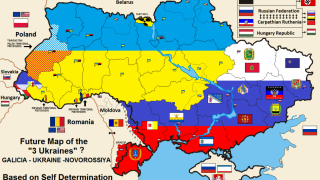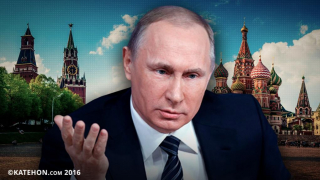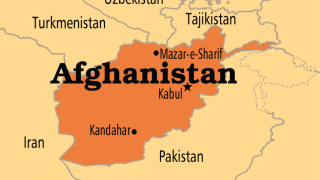THE GROWING CONFRONTATION BETWEEN RUSSIA AND THE WEST
Current political ideologies emerged under the protection of Modernity and ended up crystallizing during the 19th and 20th centuries in the heat of wars. The first political ideology that emerged was liberalism, which was nothing more than a reflection of the values and laws created by bourgeois society. During the 20th century liberalism, communism and nationalism clashed, but liberalism eventually triumphed over all of its adversaries and competitors. Today liberalism is the only remaining political ideology. Of course, liberalism has mutated and transformed over time, but the principles it defends remain more or less the same: individualism, utilitarianism and hedonism, that is, a kind of "subjective materialism" based on the cult of private property, to money and capital.
Now, liberalism is the only ideology that has world hegemony and this leads us to conclude that it is the ideology that sustains the military and economic power of the West. All US or EU embassies anywhere in the world, as well as US and NATO military bases, research centers and technology labs, financial donations, NGOs and even offices of major Western corporations and companies are also centers of propagation of this ideology linked to liberalism and globalism.
Liberalism has expanded militarily, politically, geopolitically and economically throughout the world thanks to the West, although this form of expansion has different edges depending on the country it affects: in some places this expansion begins with politics, in others with the economy, there are where it expands through direct military intervention, while in certain areas it does so thanks to the diffusion of technology; There are also other vectors of expansion such as symposia and scientific conferences or humanitarian organizations and eco-activism. However, we can say that this expansion is always accompanied (directly or indirectly) by the promotion of liberalism and its ideas, as this is the operating system that moves the entire western social structure.
Marx used to say that ideology is "a form of false consciousness": such an argument can be applied to any ideology, including communism. Ideology is the way in which the ruling classes impose an official interpretation of reality. Later, Gramsci took these ideas of Marx's to the extreme and came to the conclusion that sometimes ideology is so powerful that it is even capable of overcoming the real structure of society and precipitating all sorts of historical changes. An example of this was the fact that the Bolsheviks managed to implant socialism in a country where capitalism was not fully established. Ideology was ahead of reality and subjugated it. Gramsci generalized these ideas he drew from the study of Leninism and applied them to a much broader set of social phenomena, thus developing his "theory of hegemony". "Hegemony" is precisely the expansion of an ideology that gradually or rapidly (as happens during a revolution) subjugates all aspects of society. Hegemony is achieved through ideas, theories or thoughts, which are the weapon and the ultimate goal of all “mental warfare”.
It is clear that liberalism pretends to be universal and global and tries to achieve total ideological hegemony by cutting the reality that only expresses the interests of the ruling class (the globalist technocratic elite). It is through this process that liberalism tries to hide its ideological reality, presenting itself as a "natural process", as "progress", "development", etc., that is, being the expression of reality and its laws.
However, Western liberalism is going through a process very similar to the one suffered by the USSR several decades ago: it is obvious that the distance between ideology and reality is increasing. Ideological assumptions no longer have to do with everyday events and that is why ideology becomes aggressive, violent and totalitarian. Every ideology – and liberalism is the ideology that currently dominates the world – is nothing more than a virtualization of reality, a scheme, an approximation or a construction. This is why Marx considered ideology a form of "false consciousness", as it was a kind of projection of the subject's ideas onto the object. Reality partially conforms to these projections, but it also rejects them. Ideology is effective only insofar as it manages to maintain a balance between action and resistance. However, there always comes a time when this inner ability to manipulate things runs out and you can no longer continue to act in reality. The USSR collapsed three decades ago for the same reasons and now Western liberalism is experiencing something similar. Furthermore, the West is trying to do something that the USSR never did: replace reality with virtuality and thus force all of humanity to emigrate to a digital world or become mutants. Posthumanism aspires for humans to lower their consciousness to the cloud and thus merge man with machine or alter us through genetic engineering and transfer all our decisions to Artificial Intelligence. The only way to avoid the collapse of liberalism is precisely to eliminate reality and replace it with virtuality.
Of course, the contradictions between liberalism and reality increase, so if the virtualization of consciousness continues to expand, it means that the liberal project will fail and eventually collapse. Liberalism says that today the world economy is driven by the tertiary sector (digital services) and that the secondary (industry) and primary (agriculture) sectors have become irrelevant. However, both industry and agriculture remain relevant.
Liberalism also said that nation states would disappear completely and that humanity would be unified by a world government (something liberal theories of International Relations assert). The UN, and the League of Nations before it, are the prototype of this World Government. However, they still haven't reached their goal. Not even the European Union has managed to eliminate the nation-states of Europe. Even the inter-ethnic contradictions and conflicts between different peoples have not disappeared. Ideology tells us one thing while reality is another.
Liberalism also claims that religious and ethnic (including racial) identity has disappeared. However, this is not true, and inter-ethnic struggles continue to shake not only non-Western societies, but the West itself.
In turn, gender ideology claims that in the West sexual identity is optional and that each individual can define himself, but marriage between a man and a woman, along with the family, continues to prevail in Western countries while in non-Western countries. is even much stronger.
We could go on listing many other cases, but the important thing is to show that liberalism is an ideology that makes discursive claims that are not fulfilled in practice. The problem with all this is that the West wants to impose this ideology on everyone and attacks anyone who wants to mitigate or adapt its premises to its own cultural reality. We witness how Trump tried to return to much more realistic and less ideological positions only to be accused of committing every possible sin: “fascism”, “racism”, “sexism”, “supremacism”, etc. However, his only crime was to point out the contradictions and gaps that existed between ideology and practice within the United States itself.
Now, the confrontation between Russia (in addition to China, Iran and Islamic societies in general) against the West is based on this ideological and geopolitical struggle. Neither the Russians nor the Chinese are willing to take the premises of liberalism to their ultimate consequences and unconditionally and uncritically accept all the assumptions of Western hegemony. However, the underlying problem is that Russia remains trapped in a system based on liberal democracy, economic capitalism and the technocratic digitization of reality. And therein lies our contradiction: we adopt many liberal assumptions, but we continue to oppose direct geopolitical subordination to the West. And for that we resort to the old-fashioned forms of Western liberalism as a way of resisting such an attack.
China has accepted liberalism and economic globalization, but has retained the political authority of the Communist Party, so the Chinese are in much better shape than we are. As for Russia, we have to abide by the rules that the West has imposed on us, but since we don't want to lose our independence (all globalists must sell their souls to liberal hegemony), we are forced to break or deftly circumvent them.
The conflict between Russia and the United States – in neighboring Ukraine, but also in the rest of the post-Soviet space, the Middle East, Africa and, probably, Latin America in the near future – is only situational and pragmatic. Putin has restored some of the sovereignty that Russia lost in the 1990s under Yeltsin (who was a man with no common sense) and the Liberals (all direct agents of Western hegemony). But hegemony and liberalism have penetrated much deeper than we usually imagine, as our society, state, laws, norms and political practices follow Western models. All we have done so far is reject liberalism in its most radical forms: external governance, primacy of international law over national law, gender ideology (LGBT legislative normalization and other perversions), etc, but we continue to cling to the "false consciousness" that the West and other societies under its influence have imposed on us. This is why we remain vulnerable, as we are part of the global West, while constantly rebelling against its center. We are a branch that became independent from a corporation that operated abroad, but we remain attached to the laws it left us.
Such a situation is extremely disastrous for Russia, especially since liberalism is not only collapsing in the West, but in the rest of the world. The problem is that Russia has come into conflict with this false consciousness that has been imposed on it. However, we will not be able to detach ourselves as long as we remain trapped in liberalism, bourgeois democracy and capitalism.
The time has come when we must put the West aside and turn this conflict into a true clash of civilizations and a war of ideas. That is why we must assume our own ideology and oppose the West. Only then will we stop dancing to the rhythm of the music that is playing and we will not have to continue to imitate it.













